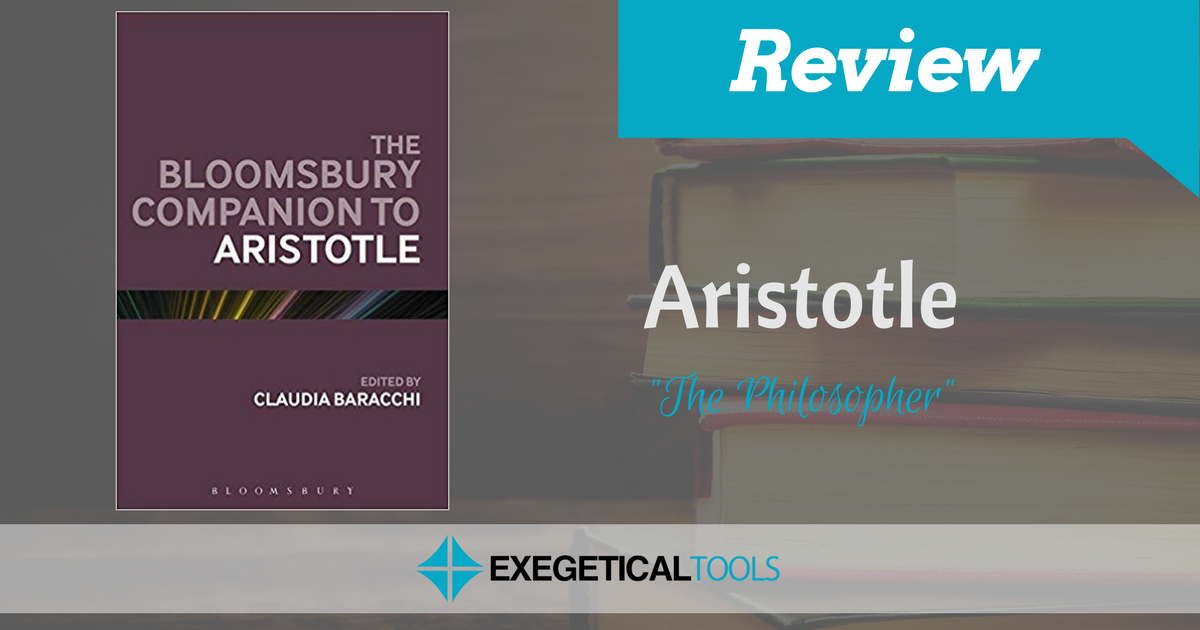The Bloomsbury Companion to Aristotle, ed. Claudia Baracchi (Bloomsbury, 2013), 418pp.
Biblical scholars often profess the desire to know philosophy better (or any philosophy), and rightly so. Philosophical movements have undergirded many shifts in biblical studies (think Hegel and Baur; Heidegger and Bultmann; or read the first part of N. T. Wright’s New Testament and the People of God for an admirable attempt at using philosophy to formulate a biblical-theological method).
If one wants to study philosophy, one must start with the classical world. Western thought traces back to Homer’s Iliad and Odyssey, after which the pre-Socratics begin theorizing with metaphysics (the study of being). After the pre-Socratics come the big two, Plato and Aristotle. One should understand Plato’s main lines of thought before diving into Aristotle, but both should be mastered. Not only are they the foundation for all of philosophy, they are essential for understanding the Greco-Roman worldview (esp. Aristotle) and early Christian theology (esp. Plato). Such knowledge is useful for biblical scholars.
As a student of the Bible, I value handbooks and companions on philosophical figures, such as this new companion to Aristotle. It allows me to quickly get a sense for the important issues in Aristotelian studies and work through the essays that are relevant to my interests. These essays point me to further works that might help me, or I might get all I need.
This companion is divided into two parts: Questions and Disseminations. The second part contains four essays, while the first part contains fourteen essays in seven parts: Logos, Phusis, Psuche, Philosophia Prote, Ethos, Polis, and Poiesis. While the book is only 400 pages, it’s smaller font in a two column format (yet still just a 6×9 book), so there is a good amount of content. Greek enthusiasts will be happy to find Greek printed throughout from Aristotle’s writings as they are discussed or even exegeted.
Readers will be especially helped by the essays on rhetoric, metaphysics (first philosophy), and ethics. These are topics on which biblical students should be knowledgeable, especially the thoughts of Aristotle as he interacts with Plato and the rest of the tradition before him. Aristotelian metaphysics is foundational for much of the medieval period, e.g., Aquinas, and even modern Catholic tradition, and Aristotle’s account of virtue is still useful for Christians today (e.g., virtue theory). The essay on metaphysics by Alejandro Vigo also discusses the relationship between ontology and theology.
The final part with four essays on disseminations include essays on specialized topics, such as whether Aristotle would be a communitarian. The essay asking what remains of Aristotle’s Metaphysics today is provocative, given what modernity has done to classical understandings of being.
There are actually several helpful indices in the back of the volume. There is a 35-page glossary of Aristotelian terms, very helpful for those entering into reading Aristotle. There is also an eight page chronology of recent research, four pages of resources including where to find Aristotle’s Greek and English texts for free online. The chronology of recent research is an especially helpful index I’ve never seen before. It categorizes philosophical issues and provides foundational works on that topic with respect to Aristotle and works that subsequently interact with the foundational works.
Given all that Aristotle wrote about, it would be impossible to create a volume that covered all of his interests. Indeed, some of the essays in this volume are quite specialized (one essay covers one phrase in Physics IV.11, 14), while other issues are completely ignored (e.g., his political theory!). The indices, however, make valuable resources for those interested in studying Aristotle. This companion would work well in concert with a more comprehensive introduction to Aristotle, or with the Aristotelian chapter from one or two surveys of Western thought (I suggest W. T. Jones’s series as the best).
Buy the Companion to Aristotle here.


